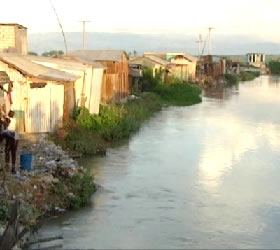 Tens of thousands of people in Haiti are still threatened by an outbreak of cholera despite some signs that the epidemic is stabilising, the UN says.UN humanitarian co-ordinator in Haiti Nigel Fisher said the UN was preparing for a wider outbreak although there were no new signs of it spreading.The Haitian government earlier said that only six new deaths were reported in the past 24 hours.A total of 259 people are now known to have died from the disease.Three hundred new infections have been recorded, taking the total to 3,342, Haiti’s health ministry said.
Tens of thousands of people in Haiti are still threatened by an outbreak of cholera despite some signs that the epidemic is stabilising, the UN says.UN humanitarian co-ordinator in Haiti Nigel Fisher said the UN was preparing for a wider outbreak although there were no new signs of it spreading.The Haitian government earlier said that only six new deaths were reported in the past 24 hours.A total of 259 people are now known to have died from the disease.Three hundred new infections have been recorded, taking the total to 3,342, Haiti’s health ministry said.
Frightened nation.“This is an extremely serious situation and based on experience with epidemics elsewhere it would be irresponsible to plan for anything but a considerably wider outbreak,” Mr Fisher said on Monday.The UN and aid agencies are now also boosting prevention efforts in and around Haiti’s capital Port-au-Prince, where some 1.3 million survivors of January’s devastating earthquake live in tent camps.
Five cholera cases were detected on Saturday in Port-au-Prince, but they were quickly diagnosed and isolated. Another 20 suspected cases were under investigation, medical aid organisation Medecins Sans Frontieres (MSF) told the BBC.
Haiti has not seen a cholera outbreak for 100 years and many people are said to be frightened by the news of the outbreak and unsure of what steps to take to avoid the disease.Poor sanitary conditions make the camps and slums vulnerable to cholera, which is caused by bacteria transmitted through contaminated water or food.Cholera causes diarrhoea and vomiting leading to severe dehydration, and can kill within 24 hours if left untreated. It is easily treated through rehydration and antibiotics.
Planning for the worst
The director general of Haiti’s health department, Gabriel Thimote, confirmed on Monday that the rate of increase in cholera deaths had slowed.However, the number of infections had increased by 10% since Sunday, rising from 3,015 to 3,342, and aid agencies insisted they would remain on alert.”We think that the situation is stabilising. That doesn’t necessarily mean we have reached a peak – Bcc











